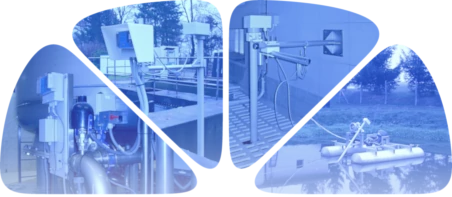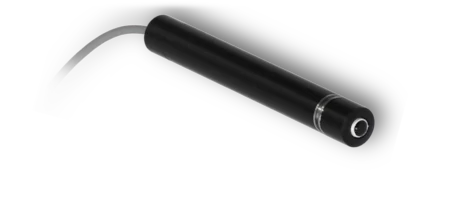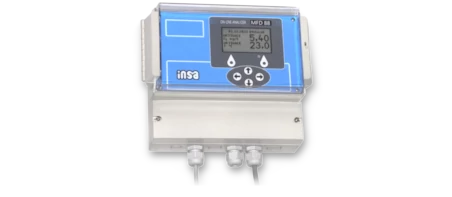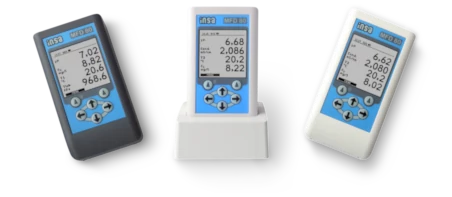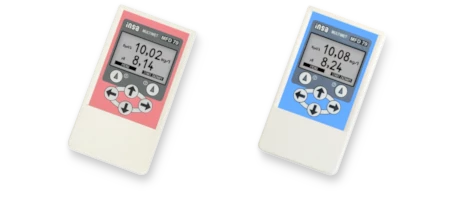pH value: Sensors
Appropriate sensor is fundamental to any measurement setup. Variety of different types and variants are available, depending on the measured quantities, sensor dimensions, as well as usage workflow, environment, and installation method. The vast majority of sensors listed below are just components of a larger measurement setup, and can therefore be satisfactorily used only with a compatible analyzer. Sensors for in-technology measurements should be installed inside our probes, ensuring their fixing and protection, and these connect to a terminal block. Variants for laboratory and portable usage are terminated with the appropriate connector. Sensors generally have the shortest lifetime of the entire setup, due to direct contact with the measured medium.
pH sensors
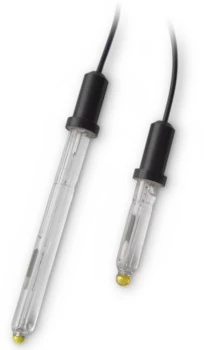
Glass sensors for measuring pH integrate both the pH electrode and the required reference electrode in one unit.
Individual variants differ depending on the purpose of the sensor, mainly in terms of length, shaping of the active part and method of attachment. Sensor cables for laboratory use are terminated with a connector according to the type of instrument used.
Glass electrodes cannot be used in the presence of fluoride ions. In this case, antimony electrodes (available on request) are used. The alternative designations listed below apply to previously supplied sensors.
| Type | Suitable for | Dimensions | Alternative designation |
| 01-29G | Installation with SPO41, SPO42, SPR42, SVK42, PE G3/4D | Ø12.2 x 115 mm | pH 21PT |
| 01-30G | Installation with SPO41ME, SPR41ME | Ø12.2 x 115 mm | pH 21PTC |
| 01-29GK | Installation with PB42V, PB43V, SPO41K, PE G3/4K | Ø12.2 x 57 mm | pH 21PTK |
| 01-30GK | Installation with SPO41MEK, SPR41MEK | Ø12.2 x 57 mm | pH 21PTCK |
| 521-BNC | Installation with SHI63 | Ø12.2 x 59 / 117 mm | - |
| PH21S | MFD79, MFD80 (with transport cover) | - | |
| on request | Laboratory measurements (multiple options) | typ. Ø12.2 / Ø18 x 115 mm | - |
Reference electrodes
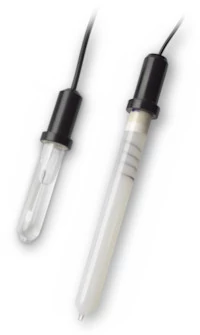
For sensors that do not have an integrated reference electrode, separate reference electrodes are required – this is often the case with ion-selective electrodes. Since a pair of separate electrodes is then used, industrial applications will need a suitable probe or flow-through unit that allows at least two sensors to be installed.
Commonly supplied sensors for measuring pH and ORP have the required reference electrodes already integrated, so there is no need to supplement them with additional electrodes.
| Type | Suitable for | Dimensions |
| RAE111 | Installation with SPO42, SPR42 | Ø12.2 x 115 mm |
| RAE111K | Installation with PB42V, PB43V | Ø12.2 x 57 mm |
| on request | Laboratory measurements (multiple options) | typ. Ø12.2 (Ø18) x 115 (145) mm |
Temperature sensor TTK21
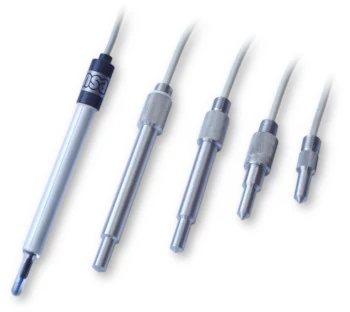
Separate temperature sensors are primarily used to compensate for the temperature dependence of sensors not equipped with built-in temperature sensing. This improves the accuracy of the measurement. The measured temperature reading is usually also available as an output for the user.
| Type | Suitable for | Dimensions | Case material |
| TTK21PL | Industrial probes | Ø14 x 115 mm | Stainless steel |
| TTK21PM | Industrial probes | Ø14 x 94 mm | Stainless steel |
| TTK21PS | Industrial probes | Ø14 x 60 mm | Stainless steel |
| TTK21PX | Industrial probes | Ø10 x 40 mm | Stainless steel |
| TTK21L | Laboratory use | Ø12 (Ø14.5) x 115 (145) mm | Glass |
| Sensor type | NTC thermistor | ||
| Measurement range | -5 to +105 °C | ||
| Compatibility | MFD79, MFD80, MFD88 | ||
| Resistance at 25 °C | 3000 Ω | ||
- Downloads:
 Temperature sensors TTK21 - dimensions
Temperature sensors TTK21 - dimensions
Temperature sensors TNiK21, TNiK115
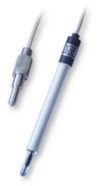
Separate temperature sensors with nickel-type sensing element are only compatible with some older types of our devices. Pay attention to the data in the table.
| Type | Suitable for | Dimensions | Case material |
| TNiK21 | Industrial probes | similar to TTK21 (multiple options) | Stainless steel |
| TNiK115 | Laboratory use | Ø12 (Ø14.5) x 115 (145) mm | Glass |
| Sensor type | Nickel | ||
| Measurement range | -5 to +105 °C | ||
| Compatibility | MFD77, MPH77, MPI77, MFD77PHK, MSV77 (MPH66, MFD66, MFD66PHK, MPI66, MPH66L, MPH44P, MPH44L, MPH44LN, MPH44LT, MPH44, MPH44E) | ||
| Resistance at 0 °C | 2000 Ω | ||
